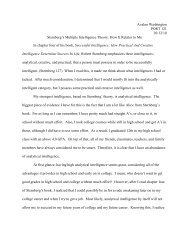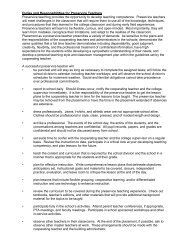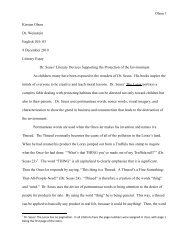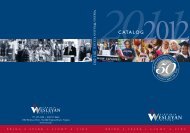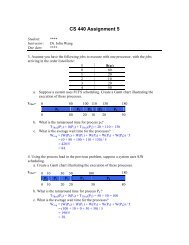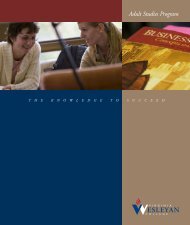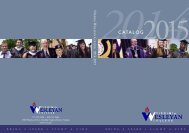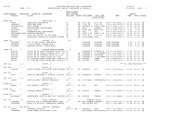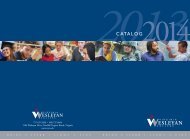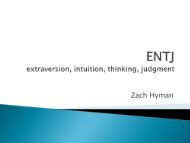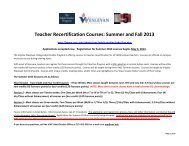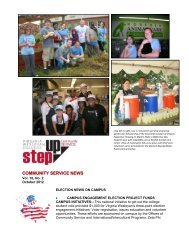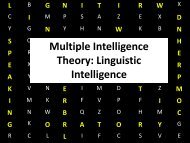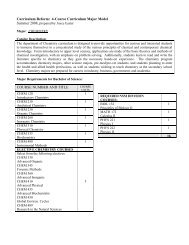2008-2009 Catalog - Virginia Wesleyan College
2008-2009 Catalog - Virginia Wesleyan College
2008-2009 Catalog - Virginia Wesleyan College
- No tags were found...
You also want an ePaper? Increase the reach of your titles
YUMPU automatically turns print PDFs into web optimized ePapers that Google loves.
162 RELIGIOUS STUDIES319 Christian Ethics (4)Focuses both on the distinctiveness of “Christian ethics”over against other ethical theories (e.g., ethical egoism,utilitarianism, etc.) and on the different ways in whichChristians themselves use biblical texts within theologicalethics. Prerequisite: at least three semester hours in one ormore of the following: English, history, philosophy,religious studies. Offered intermittently.320 Science and Religion (4) (V)Centers around two main questions: What has been theimpact of science on theology, and are science and religionincompatible? The first question is primarily historical. Weexamine key advances in the history of science (theheliocentric theory of the universe and evolution, forexample) and theological responses to them. The secondquestion is primarily philosophical. In each case,discussions take their departure from the issues raised inimportant primary texts. Prerequisite: junior/senior status,or at least one course in the natural sciences or consent.Offered intermittently.324 Local Religions in Practice (1)The study of religion, long dominated by the study ofwhat “believers” were “thinking", also has a long traditionof observing what adherents were doing. From the earliestsociologist and anthropologists, the study of religion hasnever been complete without an understanding of religionin practice. This course introduces students to the practicesof participant-observation and ethnography, as well as tosome of the foundation literature and pressing questionsstill asked in the study of people in the course of theirreligious lives. Offered on demand.326 Methodism (4) (H)An interdisciplinary exploration of the history ofMethodism, with special foci upon the Wesleys, Asbury,other early itinerant preachers, and upon the religious andcultural development of the Methodist denomination andits <strong>Wesleyan</strong> offshoots (e.g. AME). Prerequisite: 4 semesterhours of religious studies or history. Offered spring of evennumberedyears.331 Rationalism and Mysticismin Religion (3)Rationalism and mysticism are radically different ways ofcomprehending the world, and yet many of the world’smajor religions feature both rationalist and mystical forms.First, this course examines rationalism and mysticism ascomprehensive and competing religious paradigms; second,surveys manifestations of religious rationalism andmysticism in the monotheistic religions, and third, examinesin detail the oscillation of rationalism and mysticism inJudaism from Late Antiquity until the 20th century.Prerequisite: at least three semester hours in one or more ofthe following: English, history, philosophy, religious studies.332 Jewish Ethics (3)Focuses on how Judaism helps people meet thechallenges of contemporary life. What do classic sourcesand contemporary thinkers say about animalexperimentation, child custody, duties to others, hazardouswaste disposal, and medical ethics? These and otherpressing concerns are treated in this course through carefulattention to classic biblical and rabbinic texts. Prerequisite:at least three semester hours in one or more of thefollowing: English, history, philosophy, religious studies.Offered intermittently.335 Christian Theology and Film (4) (V)A seminar devoted to exploring how the fields oftheology and film studies cross-fertilize each other, withspecial attention given to the ways in which film functionsas religious discourse. Students seek to investigate thehistorical evolution of film as a means of communicatingtheological doctrines or themes through its narrativepatterns and to analyze how religious and secular films havebeen and are considered as cultural texts that advise notonly how one should live, but what one should believe. Inparticular, we explore the sermonic nature of film, varioushermenuetics of film, and how audiences receive andappropriate both manifest and latent religious meanings.Identical to COMM 335. Prerequisites: three semesterhours in either communications, English, history,philosophy, or religious studies. Offered spring of evennumberedyears.336 Sociology of Religion (3)Identical to SOC 336.352/452 Seminar in C. S. Lewis (4) (V)Investigates the literary, historical, and theologicalcontributions of British author C. S. Lewis, exploring keyliterary and philosophical influences upon his life andliterature and examining how his thought and imaginationhave effected contemporary religious discourse andpractice. This course may be taught either as an on-campuscourse or as a travel course. Prerequisites: 4 semester hoursof religious studies or English. Offered spring of evennumberedyears.361/461 Thinkers/Topics in Religion (4) (V) (I)*Offers the opportunity for focused, in-depth study ofone important religious thinker (or thinker about religion),or a narrowly defined topic of current importance inreligious studies. May be repeated for credit with theinstructor’s permission. Prerequisite: junior/senior status, orconsent. Offered every year. *RELST 361(V); 461(I).363/463 Sports & Religion (4) (I)*Examines the relationship between sports and religion.From the use of sports as a means of acculturation, the useof legitimate competition as a surrogate for interreligiousconflict, and the competition between organized sports andorganized religion for money, attention, and devotion, tothe sacrality of the time and space of the field of play and



